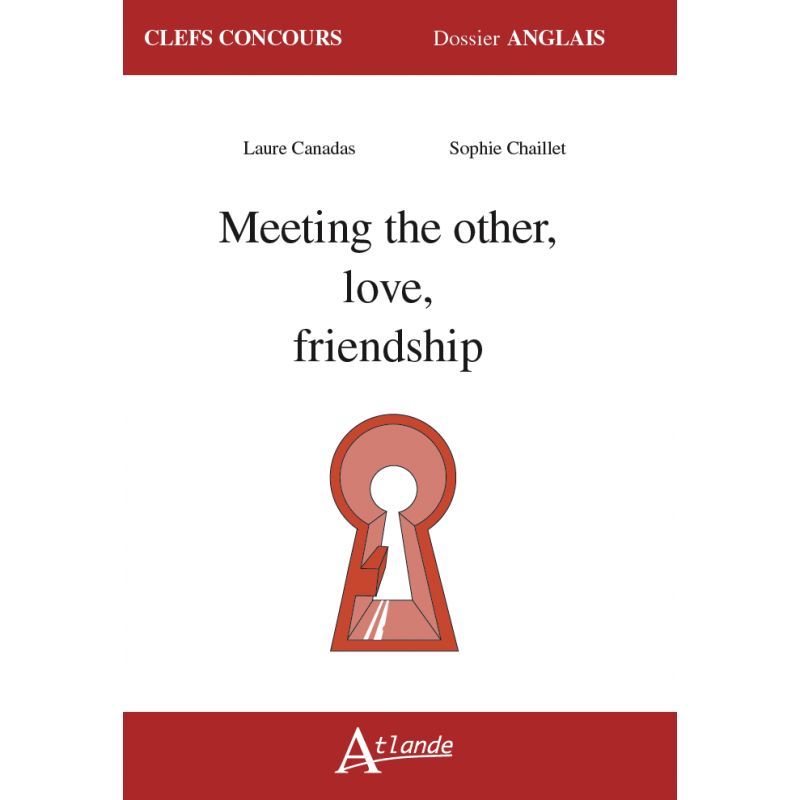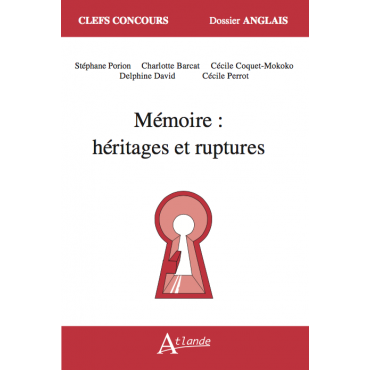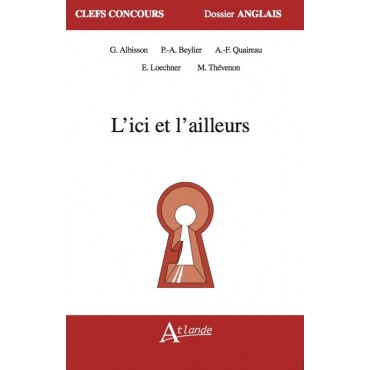



Par Laure Canadas et Sophie Chaillet
 Livraison en lettre suivie
Livraison en lettre suivie
France met. : 5€ ⭢ 24€ d'achat, 10€ ⭢ 48€, 15€ ⭢ 96€, 20€ au-delà. DOM-TOM : 12€, 20€, 28€, 40€
Traitant d’un des deux nouveaux sujets 2019 et 2020 de l’épreuve de composition du Capes d’Anglais, cet ouvrage propose tout ce dont le candidat a besoin pour réussir l’épreuve.
Comme tous les clefs-concours “dossier Anglais”, l’ouvrage est structuré en quatre parties :
Introduction
Repères sur le contexte historique et culturel
Thèmes qui structurent le sujet
Outils (bibliographie, chronologie, glossaire).
Fiche technique
Introduction
“La rencontre avec l’autre, l’amour, l’amitié” :
cadrage du B.O. 14
Structure et intérêt du présent ouvrage 15
Enjeux et problématiques 16
Conseils méthodologiques
Appréhender les textes
et aboutir à une problématique 19
L’introduction 23
Notion ou thématique ? 24
Gérer son temps et s’appliquer à la mise en forme 25
Les attentes du jury : écueils à éviter 26
A brief overview of love in literature
Meeting the other: a definition
La Rencontre/ “Meeting”
Friendship: meeting the other as self-discovery
‘Meeting the other’
as a disquieting experience
leading to the experience of loss
Art as an attempt to fight against loss: literature as an encounter between artists and their readers
The problem of “love”
A definition of love
The Platonic ideal of love in The Symposium
The elegiac mode
From the first elegies to the sonnet
The Matter of Romance 53
Chaucer’s irreverent yet virtuoso use of the vernacular 55
Elegiac poetry in the Renaissance Age
Sir Philip Sidney’s Astrophil and Stella:
first forays into English sonnet writing 63
Shakespeare’s sonnets: love’s infinite faces 65
Shakespeare’s debt to Christopher Marlowe 70
Love and Friendship in Shakespeare’s plays
Love in Shakespeare’s plays: young love
versus the necessary end of marriage 76
The comedy of love: a mechanism
that enhances the dramatic plot 77
Tragic* love in Shakespeare’s plays 82
Elegy* and love in the Age of John Donne (1572-1631)
Feminine expressions of love and friendship
during and after the Restoration
Lyric and elegiac poetry
from the Romantics to the Moderns
Lyric poetry in the 18th century 105
Romanticism*, the “Romantics” and “romantic” poetry 106
The Lake School poets 107
The Romantic project 108
The importance of imagination in Blake,
Coleridge, and De Quincey’s writings 113
The later Romantics: Shelley, Keats, and Byron 120
Love and friendship in Victorian poetry 127
In Memoriam, Lord Alfred Tennyson (1850) 137
The Moderns, “Modernism*” and meeting the other 138
T.S. Eliot’s “The Love Song of J. Alfred Prufrock” (1915) 139
W.H. Auden, the 20th century’s great poet of love? 143
Dylan Thomas (1914-1953), raging against the dying of the light 148
Variations on the theme of the couple in classic literary works: mythical friends, lovers, spouses, and nemeses
Love and marriage in the romantic and gothic periods
The shortcomings and resolutions
of romantic entanglements in Austen’s Pride and Prejudice, Sense and Sensibility, Emma 159
Looking at incipits 160
First encounters 166
The Brontë sisters: gothic representations
of love in Wuthering Heights and Jane Eyre 174
Charlotte Brontë 1816-1855 174
Emily Brontë 1818-1848 181
The figure of the double in Victorian gothic literature – Frankenstein (1818), The Strange Case of Dr Jekyll and Mr Hyde (1886) and The Picture of Dorian Gray (1895)
Mary Shelley’s Frankenstein, 1818
Robert Louis Stevenson’s The Strange Case of Dr Jekyll and Mr Hyde (1886) and Oscar Wilde’s The Picture of Dorian Gray (1895)
The Strange Case of Dr Jekyll and Mr Hyde, by Robert Louis Stevenson 194
Oscar Wilde’s The Picture of Dorian Gray (1895) 197
Meeting the other in colonial and postcolonial literature
Huck and Jim: escaping institutionalized racism in Mark Twain’s The Adventures of Huckleberry Finn
Marlow’s search for ‘existential’ friendships in Joseph Conrad’s Heart of Darkness (1899) and Lord Jim (1900)
The impossibility of interracial friendship in
E.M. Forster’s A Passage to India (1924)
Interracial friendship in
Doris Lessing’s The Grass Is Singing (1950)
Interracial friendship as an awakening in
Andre Brink’s A Dry White Season (1979)
Chimamanda Ngozi Adichie’s Americanah (2013):
of love, foreignness and belonging
Bibliography
Variations on the theme of the couple;
The figure of the double 242
Meeting the other in colonial
and postcolonial literature 243
Glossary
Laure Canadas, agrégée d'Anglais, enseigne au lycée Jean Pierre Vernant à Sèvres en classe préparatoire littéraire, en section européenne, et a enseignée la littérature étrangère en langue étrangère (LELE). Elle est spécialiste de littérature américaine du vingtième siècle.
Sophie Chaillet est professeure certifiée au lycée Jen Pierre vernant à Sèvres. Elle y enseigne en classe européenne et la littérature étrangère en langue étrangère (LELE) en terminale L.
Meeting the other”: the phrase conjures up a thousand scenes, images and words in Western literature. When Francisco Petrarca, known to the English literary world as Petrarch (1304-1374) initiated the Renaissance Age and encouraged the spread of humanism* through the study of classical ‘humanities’ (“humanitas” in Latin refers to the study of Ancient Greek and Roman texts)—the Italian poet steered Western thought and art toward the exploration of human encounters, putting love and friendship at the center storytelling and writing.

